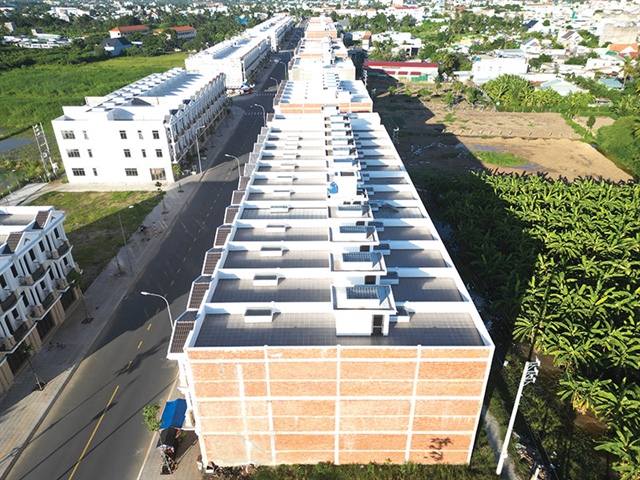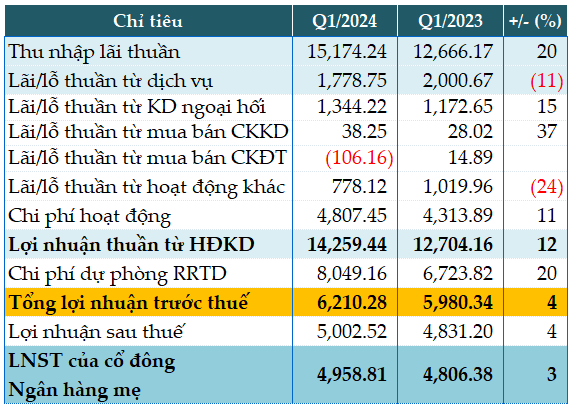
An real estate project in Tien Giang. Photo: H.P |
On January 13, 2024, the Thang Binh district police investigation agency (Quang Nam) added charges of misappropriation of trust and asset misappropriation against Le Van Thanh, in addition to the tax evasion charge that was filed in September 2023.
Mr. Thanh worked as an independent real estate broker. After receiving the deposit from the customers, Mr. Thanh did not fulfill the initial land sale and purchase agreement but sold the land plot to someone else for 21 billion VND. During the investigation, the investigative agency determined that the transfer contract only stated a price of 460 million VND, resulting in a tax loss of more than 514 million VND. Mr. P.A.T, the buyer, was also charged with tax evasion for assisting Mr. Thanh.
Although the issue of undervalued transfer prices in real estate contracts is not new, the recent complexity of the case, as well as the Land Law amendment passed on January 18, 2024, has attracted attention and lively discussions on legal forums regarding the legal issues related to this case.
Several discrepancies
According to the current provisions of the Personal Income Tax law, income from real estate transfers (transfer of land use rights and assets attached to land, ownership or use rights of residential houses…) is taxable income. The tax calculation for income from real estate transfers is based on the transfer price and the tax rate.
Currently, the personal income tax (PIT) rate for real estate transfer activities is 2%, based on the transfer price. To determine the transfer price, the tax authorities will rely on the price stated in the transfer contract at the time of transfer.
In cases where the transfer contract does not state a price or the price in the transfer contract is lower than the price of the land determined by the provincial People’s Committee at the time of transfer, the transfer price will be determined based on the land price list determined by the provincial People’s Committee at the time of transfer.
However, according to the current Land Law provisions, the land price list determined by the state authority usually reflects stable land prices over a long period of time, while in reality, land prices are subject to fluctuations, especially during certain “land fever” periods in certain areas. Therefore, the actual transfer price and the land price list determined by the state authority can differ significantly.
In this context, despite the issuance and enforcement of regulations on PIT from real estate transfers since 2009, there are still many inconsistencies in practical application. In many cases, the parties involved in the transaction (often starting from the seller) have “evaded the law” by agreeing to a significantly lower transfer price in the transfer contract to help the seller reduce PIT and other fees.
Currently, the law does not have mechanisms to verify whether the price agreed upon in the contract reflects the actual transaction value. During the notarization of transfer contracts, notaries are responsible for disseminating legal provisions to the parties and completing the notarization dossier based on respecting the agreement of the parties, as transfer contracts are civil agreements. Once the parties have agreed and notarized the contract with an agreed price, notaries usually cannot refuse.
Severe legal consequences
From a legal perspective, undervaluing in real estate transactions can lead to serious legal consequences. If signs of tax evasion are detected, the seller may be administratively fined an amount ranging from one to four times the amount of tax evasion, depending on mitigating or aggravating circumstances, if any, and must fully pay the evaded taxes to the state budget.
In addition, for cases with signs of criminal offenses, the court or tax authorities will transfer the case and coordinate with the investigative agency in the process of prosecuting and handling tax evasion according to criminal law.
Specifically, sellers who commit tax evasion with an amount ranging from 100,000,000 VND to less than 300,000,000 VND or less than 100,000,000 VND but have been administratively fined for tax evasion or have been convicted of this offense, have not had their criminal records expunged, and continue to violate the law, will be fined from 100,000,000 VND to 500,000,000 VND or imprisoned from three months to one year.
For buyers, the act of agreeing to a low price may be seen as assisting the seller in evading PIT. Therefore, buyers may also be held criminally liable for aiding and abetting (assisting in providing mental or material conditions for the commission of a crime).
In practice, in some situations, buyers may not intentionally agree to a low price in the transfer contract but only agree to help the seller due to their close relationship or to help the seller reduce the burden of PIT in order to proceed with the transaction. Or, buyers may not be aware of the legal provisions and not realize that they are helping the seller evade taxes, therefore unable to foresee the potential legal risks they may bear.
Furthermore, when carrying out a transfer with a contract price lower than the actual selling price, if disputes arise, the price stated in the contract will be the legal basis for the court’s settlement. In that case, it is difficult for the buyer to convincingly prove to the court that the actual transfer price is higher than the agreed price in the contract.
To limit the drawbacks arising from undervalued transfer prices in real estate transactions mentioned above, on January 18, 2024, the National Assembly passed amendments to the Land Law (which will take effect from January 1, 2025) with significant changes, including provisions related to the land price list.
Specifically, the 2024 amended Land Law has abolished the concept of a “land price scale” and replaced it with the concept of a “land price list”. Accordingly, the land price list will be compiled annually and applied as a basis for calculating PIT from land use right transfers for households and individuals. The initial land price list will be established by the provincial People’s Committee and announced and applied from January 1, 2026, and subsequently adjusted from January 1 of the following year.
Therefore, starting from January 1, 2026, the taxable income for PIT from real estate transfers will be based on the land price list, instead of the price stated in the transfer contract. In other words, regardless of whether the parties engage in a transaction with a lower or higher actual price than the land price list, the tax authorities will still rely on the price in the land price list at the local level to calculate the PIT to be paid. Although the land price list may still lag behind the market price, with annual adjustments, the land price will not deviate significantly from the market price and will more accurately reflect the actual transaction prices between the parties.
With this regulation, it is expected that the land price list will be closer to the market price in each area and will be uniformly applied by relevant agencies, organizations, and individuals. On the other hand, the regulation and application of the land price list also ensure transparency and objectivity in real estate transfer transactions, reduce the burden on tax authorities in terms of inspection and examination, and minimize the legal risks for buyers and sellers in transactions.
During this period, as the 2024 amended Land Law has not yet come into effect, individuals participating in real estate transfer transactions must comply with the legal provisions, make accurate and honest declarations, and accurately disclose the actual transfer prices in the transfer contracts and tax declaration documents to avoid potential legal consequences in the future.
Nguyen Thi Thu Thuy (Phuoc Law Firm and Associates)









































